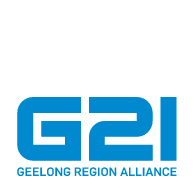The 2021 Federal Budget investment in training, jobs and social repair will benefit Geelong and the G21 region says G21 CEO Giulia Baggio.
Social repair
“Following the dislocation and disruption caused by the COVID pandemic, the wellbeing of people must come first, and it is heartening to see that the Federal Budget is focused on the many needs across our communities,” Ms Baggio said.
“Measures to rebuild skills and jobs, long-overdue reforms to aged care, investment in mental health care, childcare support, improvements to women’s economic security, a spotlight on domestic violence and funding for the NDIS are all significant and welcome.
“The funding from each of these initiatives has the potential to stretch widely across our region to the benefit of G21’s diverse communities. Our challenge is to make full use of these opportunities over the months and years ahead.
Housing Affordability
“However, the Budget largely fails to address the structural economic and social issues of rapidly increasing housing prices versus lower or stagnant wages over coming years,” Ms Baggio said.
“The high cost and lack of availability of rental housing is already impacting many parts of our region. Support services are reporting increased numbers of families unable to find affordable housing. Employers, such as those in Colac, are unable to fill jobs due to a local lack of rentals or other accommodation.
“Although the Budget includes a package to allow eligible single parents to buy a home with as little as a 2 per cent deposit using a government guarantee, the scheme will be limited and will do little to alleviate the housing affordability crisis within much of this region.
Tourism
“The lack of a targeted Jobkeeper-style program is a double whammy for the region’s visitor economy. A significant slice of our regional economy is visitor-based. Many businesses, like those along the Great Ocean Road, depend largely on international visitors.
“Borders are projected to remain closed well into 2022; possibly not fully opening until much later. This will further compound a chronic shortage of workers for the tourism and hospitality sectors which traditionally employ international students, skilled workers and migrants.
“G21 does, however, welcome the economic stimulus to come from Geelong City Deal funding increasing by $18 million to $64 million in the next year.
Environment – Clean energy
“The Budget allocates $275.5 million for hydrogen initiatives, including four hydrogen production hubs in regional areas. Geelong must position itself to host one of those hubs. The region is ideally located and has substantial existing infrastructure,” Ms Baggio said.
“This is an opportunity for the region to be part of the growing global hydrogen export market, bringing jobs and new business opportunities.”
International education
“The lack of funding for a largescale quarantine facility in Victoria, as proposed by the state government, is disappointing,” Ms Baggio said.
“International students are important contributors to our local economy and community, and especially in our tertiary institutions such as Deakin University. Without vastly improved high-volume quarantine facilities, our universities remain in a dire situation.
“Given the Budget assumption of borders remaining closed until 2022, and then only transitioning to full opening, this is concerning.”
Skills Training
“New apprenticeships and training places for jobseekers and young people are welcome and especially relevant to a region such as ours which is growing rapidly. Diverse skill sets are needed to drive the residential, manufacturing and business growth the region is experiencing,” Ms Baggio said.
“It must be noted that apprenticeships have been in decline in recent years and the Budget measures will start to arrest this decline. However much more is required in this space.”
Gender equity
“The package of measures to address inequities and discrimination affecting Australia’s women is particularly welcome,” Ms Baggio said.
“It is encouraging that the federal government is responding to advocacy in recent months drawing attention to a range of matters that need to be addressed in this regard.
Note: G21 will continue to analyse the detail of the Federal Budget and its ramifications for the region over the coming days.












